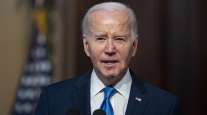DOT to Consider Exempting 20 Deaf Drivers From Minimum Hearing Rule for Their CDLs
This story appears in the Oct. 24 print edition of Transport Topics.
Twenty deaf or hard-of-hearing people are being considered for exemptions from a federal regulation setting minimum hearing requirements for commercial drivers, the first exemption applications to be considered in more than two decades, the Federal Motor Carrier Safety Administration said.
The National Association for the Deaf is advocating on behalf of the applicants, who submitted the requests for commercial driver licenses in July, the group said.
“Although the NAD has long fought for equal access and opportunities for deaf truckers, this is the first time the United States Department of Transportation has agreed to consider waiving its hearing requirements for deaf drivers,” NAD stated on its website this month.
NAD contends that the standards FMCSA applies to CDL applicants are not fair to people who are deaf or who have a hard time hearing.
“These physical qualification standards include a requirement that unfairly barred deaf and hard-of-hearing people from driving commercial motor vehicles in interstate commerce,” it said.
The group of drivers requesting exemptions includes both deaf and hard-of-hearing drivers who do not meet FMCSA’s requirements, NAD said.
NAD did not respond to requests for further comment by press time.
FMCSA confirmed that it is considering the applications, and it will soon seek public comment on the waivers, a required step before granting exemptions.
The agency’s exemption process allows individual CDL applications to be immune from certain physical requirements that are in regulations, a spokeswoman told Transport Topics.
When FMCSA grants an exemption, the requirements still stand, but the driver, who has proven that he or she can drive a commercial vehicle with a level of safety equivalent to drivers who fit the qualifications, is exempted from certain requirements, she said.
Determinations are made case by case and publicized in the Federal Register.
NAD’s requests on behalf of the 20 drivers are the first requests for waivers to the hearing standard since FMCSA, then an office of the Federal Highway Administration, established its current exemption system in 1988, the spokeswoman said.
FMCSA’s regulations require that a commercial driver be able to hear a “forced whispered voice” in his or her better ear from 5 feet away, with or without a hearing aid.
If the driver’s hearing is tested with an audiometric device, he or she must be able to hear, in the better ear, 40 decibels at 500 Hz, 1,000 Hz and 2,000 Hz, also with or without a hearing aid.
American Trucking Associations supports opening truck driving jobs to more people, but only if FMCSA deems them to be safe, said Boyd Stephenson, manager of safety and security operations for the group.
“We have an immense driver shortage in the industry, and we want to do everything that we can to mitigate that,” Stephenson told TT.
But carriers have a responsibility to make sure drivers are physically safe to do their jobs, and FMCSA needs to recognize that in giving exemptions, he said.
“We are always supportive of exemptions to the medical requirement, provided that FMCSA has done their homework and made sure that these folks that are getting exemptions are at least as safe as drivers who would otherwise be medically qualified,” he said.
The agency has not conducted or commissioned research to determine whether the deaf drivers are as safe as those who meet qualifications, the FMCSA spokeswoman said.




